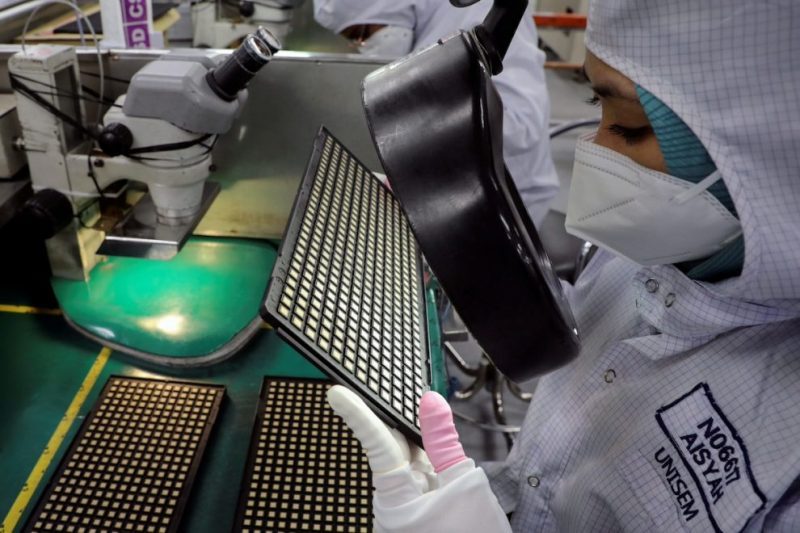South Korea’s major chipmakers – Samsung Electronics and SK Hynix – are likely to avoid the bulk of new restrictions on memory chipmakers imposed by the Biden administration on companies in China, sources say.
The new measures are planned to slow Beijing’s technological advances and military capabilities, according to the sources, who said that Washington did not want to harm businesses of a key ally.
The Commerce Department, which plans to release new curbs on exports of technology to China this week, will likely deny requests by US suppliers to send equipment to Chinese firms like Yangtze Memory Technologies (YMTC) and ChangXin Memory Technologies (CXMT) if they are making advanced DRAM or flash memory chips, the sources said.
However, licence requests to sell equipment to foreign companies making advanced memory chips in China will be reviewed on a case by case basis, sources said, potentially allowing for them to receive the equipment.
“The goal is not to hurt non-indigenous companies,” one of the people briefed on the matter said.
The White House and Commerce Department declined to comment, while SK Hynix, Samsung Electronics, YMTC, and CXMT did not respond to requests for comment.
ALSO SEE:
US Seen Blocking More Chip Exports From China’s Military
Advanced DRAM Chips to be Targeted
The move could assuage the worst fears of South Korean memory chipmakers that the United States might hobble their China-based manufacturing business in its effort to thwart China’s rise, cripple YMTC and protect vulnerable US memory chipmakers.
They still worry, however, that the case-by-case review standard is far from an explicit green light for US equipment to be shipped to their Chinese facilities and could result in bickering with regulators over what shipments to approve.
Details of some of the new regulations facing China-based memory chipmakers have not been previously reported.
The new curbs target China-based producers of DRAM chips, which hold information from applications while the system is in use, and NAND chips, which are used for data and file storage.
US suppliers seeking to ship equipment to China-based semiconductor firms would not have to seek a licence from the Commerce Department if selling to firms producing DRAM chips above the 18 nanometer node, NAND Flash chips below 128 layers, or logic chips above 14 nanometres, the sources said.
However, US companies selling sophisticated technology to indigenous Chinese chipmakers producing DRAM chips at 18 nanometres or below, NAND flash chips at or above 128 layers or logic chips at or under 14 nanometres would have to apply for a license that would be reviewed with the tough “presumption of denial” standard.
U.S. suppliers seeking to sell the equipment to non-Chinese origin companies operating in China and producing those same types of chips would also face a licence requirement but the applications would be reviewed on a case-by-case basis, the sources added.
‘Expanded View of National Security’
If published as expected, the rules would mark the first US bid through export controls to target Chinese production of memory chips without specialized military applications, representing a more expansive view of American national security, according to export control experts.
They would also hit YMTC, a rising power in manufacturing NAND chips founded in 2016. Its expansion and low-price offerings represent “a direct threat” to US-based Micron Technology and Western Digital Corp, the White House said in a June 2021 report.
YMTC is already under investigation by the Commerce Department over whether it violated U.S. export controls by selling chips to Chinese telecoms company Huawei Technologies Co Ltd. Its chips are being evaluated by Apple Inc for inclusion in some of its iPhones in China, a major concern for U.S. lawmakers and the Biden administration.
The rules could also hurt CXMT, a state-backed Chinese company that is working to enter the DRAM market.
LAM Research Corp, Applied Materials Inc and KLA Corp, major US vendors of equipment to make chips, are likely to be hit by the restrictions. LAM and Applied Materials did not respond to requests for comment. KLA declined to comment.
‘Supressing Emerging Markets’
The Chinese Embassy in Washington on Thursday described the expected rules as “sci-tech hegemony.” It accused the United States of using its “technological prowess … to hobble and suppress the development of emerging markets and developing countries.”
South Korea’s Samsung has a facility producing NAND Flash memory chips in China’s Shaanxi Province. South Korean rival SK Hynix has purchased Intel Corp’s NAND flash memory chip manufacturing business in Dalian and produces DRAM chips at another China-based facility.
According to consulting firm Yole Intelligence’s Walt Coon, 25% of SK Hynix’s and 38% of Samsung’s NAND wafer production is based in China, and about 50% of SK Hynix’s DRAM production is in China.
Earlier reports noted that the United States was considering limiting shipments of American chipmaking gear to memory chip makers in China including YMTC, part of a bid to halt China’s semiconductor sector advances and protect US companies.
And last month the Biden administration was reported to be planning to broaden curbs in October on US shipments to China of semiconductors used for artificial intelligence and chipmaking tools.
- Reuters with additional editing by Jim Pollard
ALSO SEE:
Samsung to Triple Microchip Production Due to Soaring Demand
US Leads Chip Supply Chain Meeting With Taiwan, Asian Allies
US Ban on Nvidia, AMD Chips Could Backfire, Analysts Say
























